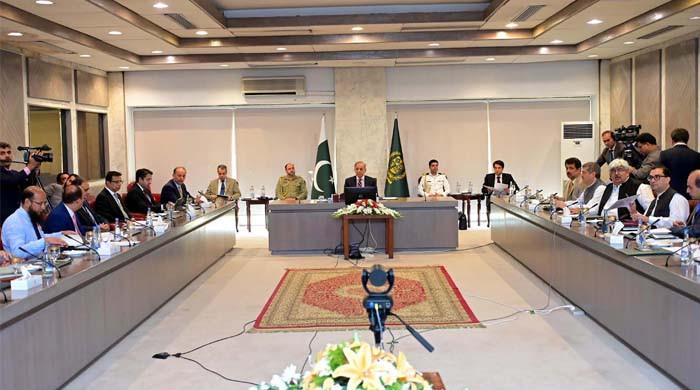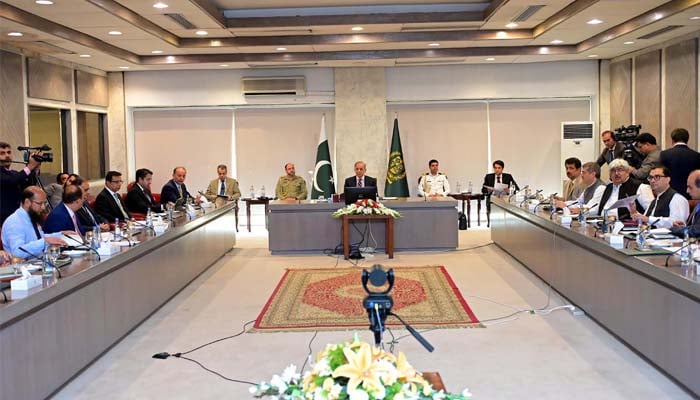Govt authorises JVs to relocate Chinese industries to Pakistan


- Prime Minister Shehbaz says boosting FDI among govt’s priorities.
- Calls for a review of the draft legislation for SEZ’s One-Stop Shop.
- Underscores commitment to fostering local, foreign investment.
Prime Minister Shehbaz Sharif on Wednesday permitted joint ventures (JVs) between the two nations to relocate Chinese industries to Pakistan, as part of its efforts to fire up the China-Pakistan Economic Corridor (CPEC) activities following his recent engagements with top officials from Beijing, state media reported.
Presiding over a meeting centred on the matters of the Board of Investment (BoI), the premier underscored the government’s commitment to fostering both local and foreign investment, which he said were among the government’s priorities
During the meeting, he spotlit the Pakistan Muslim League-Nawaz (PML-N) )-led administration’s contributions towards creating a truly business-friendly environment for traders and investors.
The prime minister, according to state-run APP, tasked the authorities to submit a detailed report on the follow-up actions related to the memoranda of understanding (MoUs) inked between Pakistani and Chinese companies during his recent visit to Shenzhen, China.
China’s President Xi Jinping in a meeting with Prime Minister Shehbaz in Beijing on June 7 had said that their two countries should focus on “promoting the joint construction of the CPEC,” and Chinese and Pakistani firms 31 MoUs covering technology, agriculture, trade, energy, coal and gasification, according to the Ministry of Commerce.
The premier also called for a review of the draft legislation for the Special Economic Zones (SEZs) One-Stop Shop, keeping in view the latest economic and business-related developments from his successful China trip.
Highlighting the potential for relocating industries, the PM identified significant potential for China’s textile, leather, footwear, and other sectors to move to Pakistan, as per the state media.
During the briefing, the BoI secretary outlined steps being taken to support this industrial relocation, including hiring Chinese experts to establish a Business Facilitation Centre in the federal capital.
Moreover, the draft “Easy Business Act” is being forwarded to the Cabinet Committee for Legislative Cases.
The meeting was attended by Federal Minister for Privatisation and Investment Abdul Aleem Khan, Federal Minister for Commerce Jam Kamal, Federal Minister for Finance and Revenue Muhammad Aurangzeb, Federal Minister for Petroleum Dr Musadik Malik, Prime Minister’s Coordinator Rana Ehsan Afzal, and other senior government officials.
In the June 7 meeting, Xi also said that China would also help Pakistan with its economic and social development.
“China will, as always, firmly support Pakistan and safeguard its national sovereignty and territorial integrity,” Xi told Sharif, adding that the two countries’ “all-weather strategic partnership… had broad development prospects.” .
But the Chinese leader also called on his guest to step up efforts to ensure the security of Chinese projects in the country.
Pakistan owes China almost 13% of its total debt, which was taken on to pay for infrastructure projects over the years and other types of spending.
Beijing has lent Islamabad almost twice as much as its second- and third-ranked multilateral lenders, the World Bank and the Asian Development Bank, to which Pakistan owes $16.2 billion and $13.7 billion respectively.
Chinese firms have also invested a further $14 billion in Pakistan since CPEC was announced in the summer of 2013 as part of Chinese President Xi Jinping’s flagship Belt and Road Initiative, data from the American Enterprise Institute think tank shows.
Most of that investment was made by Chinese state-owned energy companies financing fossil-fuel and nuclear power plants, as well as logistics routes under construction connecting Gwadar Port in the Arabian Sea with the Xinjiang region in China’s northwest.
— With additional input from Reuters
Source link



